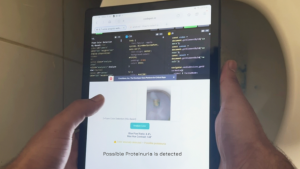When Dr William Mapham took to the 2018 Design Indaba stage, he told a story of his early years in ophthalmology. Years ago, when volunteering at the only eye hospital in Swaziland, he and his fellow doctors would often engage in outreach trips to provide vital, specialist care to the local, rural clinics. Many of these clinics were miles away, often requiring at least four hours of driving.
The Eastern Cape-born Mapham noticed that many of the rural healthcare workers had modern, well-functioning smartphones and he began considering a way to eliminate the enormous amounts of time spent travelling to and from these clinics.
“I thought to myself, ‘Everyone else is making apps. Why can’t we?” he said to a packed Conference hall. He subsequently created Vula – a healthcare app that puts primary healthcare workers directly in touch with on-call specialists. Deceptive in its simplicity, the program has the potential to revolutionise the South Africa healthcare system.
While it's rarely available at rural clinics, specialist care, according to Mapham, is often the difference between life and death for patients. When it is required, rural healthcare workers must reach out to a specialist for advice – often via fax machine or landline. But because of the amount of patients needing attention from specialists in the public sector, many of these calls, Mapham says, go unanswered.
With Vula, rural healthcare workers can get the direction their patient’s treatment requires within minutes. The user simply selects the appropriate speciality – 15 are offered on the app – and sends a detailed message that any specialist within that network can respond to. The competitive nature of doctors, explains Mapham, often leads to rapid feedback.
“Our vision,” he says, “is for every rural healthcare worker to have access to specialist advice.”
Today, Vula boasts a vast network of over 4000 doctors across South Africa, and responds to the needs of approximately 3000 patients every month – that’s one patient every 8 minutes. The mobile app has the potential to transform our nation’s desperately dismal healthcare system.
“The private healthcare system looks after about 8 million people,” says Mapham. Comparatively, 42 million people need care from public healthcare – but only 21 per cent of South African doctors work in this sector. This means that one specialist must serve the needs of over 18 000 patients.
It’s little wonder then that few in rural areas end up receiving the healthcare they need.
While conscious that ‘disruption’ has become the new buzzword, particularly in design, Mapham doesn’t see much place for it in the medical world. It’s an approach that could be exceptionally dangerous in healthcare, he says. What he prefers are the words of Saint Francis de Sales: “When you encounter difficulties and contradictions, do not try to break them, but bend them with gentleness and time.”
This is the manner in which Vula is reshaping South African healthcare; gently, discreetly, and through the subtle removal of barriers once considered ineradicable. Now being used across the country for both its intended purpose and as a teaching tool, it is ensuring that, even in the most remote areas, patients in need of something like cataract care don't have to go blind awaiting specialist advice.
More on technology and healthcare:
Cellphones hold a solution to infant mortality in Cameroon
Feel people smile with Simon Dogger’s handheld device for the visually impaired
Quicksee is making eye care accessible, affordable with low-cost tech








